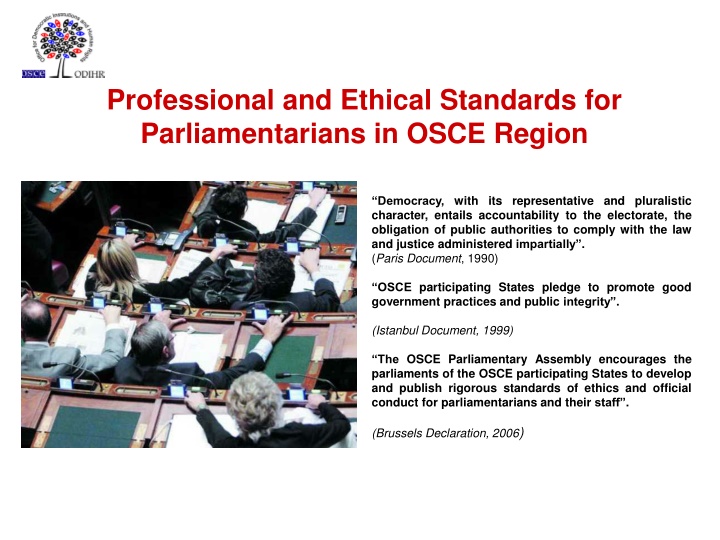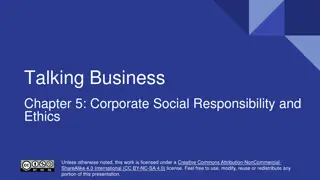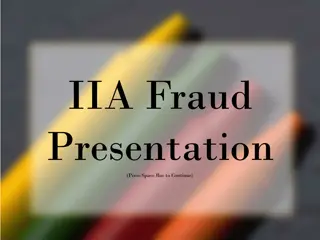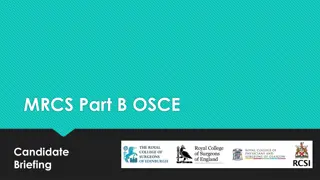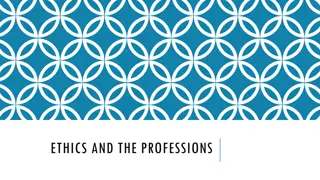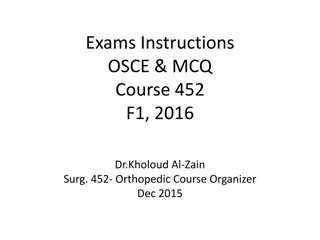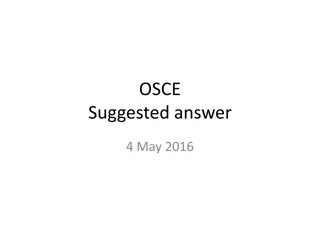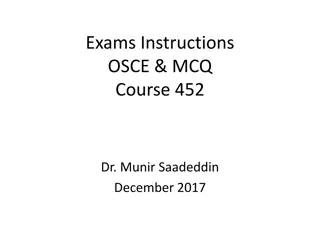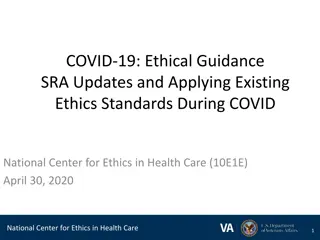Professional and Ethical Standards for Parliamentarians in the OSCE Region
Professionalism and ethical standards are integral in upholding democracy within the OSCE region. Despite efforts to promote good governance and integrity, there remains a perception of corruption within national parliaments. The introduction of codes of conduct aims to enhance public scrutiny, accountability, and prevent abuses of power. These codes emphasize common values, rules, monitoring, and sanctions for violations, ultimately fostering a culture of ethical behavior among parliamentarians.
Download Presentation

Please find below an Image/Link to download the presentation.
The content on the website is provided AS IS for your information and personal use only. It may not be sold, licensed, or shared on other websites without obtaining consent from the author.If you encounter any issues during the download, it is possible that the publisher has removed the file from their server.
You are allowed to download the files provided on this website for personal or commercial use, subject to the condition that they are used lawfully. All files are the property of their respective owners.
The content on the website is provided AS IS for your information and personal use only. It may not be sold, licensed, or shared on other websites without obtaining consent from the author.
E N D
Presentation Transcript
Professional and Ethical Standards for Parliamentarians in OSCE Region Democracy, with its representative and pluralistic character, entails accountability to the electorate, the obligation of public authorities to comply with the law and justice administered impartially . (Paris Document, 1990) OSCE participating States pledge to promote good government practices and public integrity . (Istanbul Document, 1999) The OSCE Parliamentary Assembly encourages the parliaments of the OSCE participating States to develop and publish rigorous standards of ethics and official conduct for parliamentarians and their staff . (Brussels Declaration, 2006)
Perception of Corruption in National Parliaments in the OSCE Region Parliaments in the OSCE region are perceived as the second most corrupt institution in a majority of OSCE participating States. Judiciary NGOs 2010 2013 Parliament/Legislature Political Parties 0 10 20 30 40 50 60 70 - The graph represents an average from 40 out of 57 OSCE participating States. - % of people reporting the sector/institution being corrupt or extremely corrupt (source: 2013 Transparency International Global Corruption Index)
Codes of Conduct in the OSCE The European Parliament introduced codes of conduct in 2011 Additionally seven participating States are currently engaged in developing codes of conduct Parliaments for national
The effective impact of codes of conduct Obviously the innovation does not lie in the standards themselves. What is new is the fact that rules of conduct have now been codified, thus providing a further tool for public scrutiny and enhancing accountability . (From the Maltese Parliament Code of Ethics) With such a code I have the opportunity to weight what I do, or weight what the public and external bodies expect of those who represent them in parliament. With such a code, ordinary people also have the opportunity to weight my behavior in relation to the code of conduct . (Kevin Barron MP, UK) Terms of reference for MPs and general public All official rules are explained in one place; source of guidance for MPs, media, and voters. Improved accountability The code sets clear standards against which the public and the media can judge MPs, while protecting their private lives from scrutiny. Prevent corruption The code help to prevent abuse of office and other forms of corruption setting out clear rules, monitoring their implementation, and punishing transgressions.
Codes: How do they work? Establishing common values Setting rules Encouraging monitoring Sanctioning violations Codes work best when There is underlying consensus on the rules Peers monitor one another Breaches are punished by proportionate sanctions and by peers
Which aspects to be regulated? Interests and assets Attitudes towards Compatibility of public and private roles vary greatly across the OSCE region. Expenses and allowances Two approaches are visible: Ban MPs from certain roles; Require MPs to disclose and declare their interests. Conduct in/outside the chamber Post-parliamentary employment To reveal potential conflicts of interest, two main tools are used: Register of Interests; Asset declaration. Dress and language codes
Assets and Interests One of the key objective is to avoid or limit conflicts of interest. A conflict between the public duties and private interests of a public official, in which the public official has private-capacity interests which could improperly influence the performance of their official duties and responsibilities . Three main approaches: MPs are banned from taking on certain roles, through laws on incompatibility or conflict of interest. Allow MPs to hold other interests but require them to disclose the details in ad hoc and publicly available Registers of Interests Key role of media/civil society Intermediate approach, prohibiting some interests but allowing others, as long as they are disclosed. Tools for declaring and disclosing MPs interests: Register of Interests information is centrally collected and frequently updated Assets declaration give details of wealth when they join and leave parliament.
ODIHRs work on Parliamentary Ethics - The ODIHR Background Study: Professional and Ethical Standards for Parliamentarians - comprehensive publication analysing how to set professional and ethical standards for Members of Parliament and regulate their conduct. - Upon request ODIHR supports the development of codes of conduct in a number of participating States. (e.g. Estonia, Georgia, Sweden and Ukraine) - ODIHR works on raising awareness among participating States on parliamentary ethical standards by promoting the Study and the expertise of ODIHR in this field. (e.g. Albania, Poland and Austria) - Regional Study tours on Parliamentary Ethics in 2013 and 2014 for over 40 MPs from 14 OSCE participating States. - ODIHR closely works with Field Operations to support participating States in developing codes of conduct.
Thank you for your attention! OSCE/ODIHR Office for Democratic Institutions and Human Rights ul. Miodowa 10 00-251 Warsaw Poland http://www.osce.org/odihr
